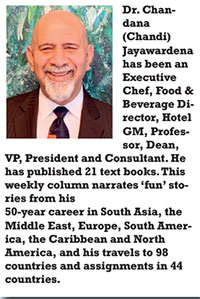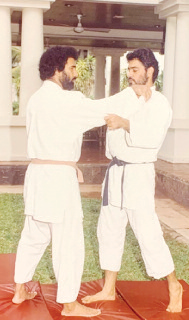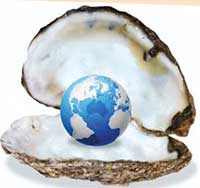CONFESSIONS OF A GLOBAL GYPSY
MORE JUDO FIGHTING
By Dr. Chandana (Chandi) Jayawardena DPhil
President – Chandi J. Associates Inc. Consulting, Canada
Founder & Administrator – Global Hospitality Forum
chandij@sympatico.ca
… Continuing from last week’s column: ‘Judo Fighting in India’.

When I travelled to India as a member of the National Judo Team of Sri Lanka in 1982, I enjoyed different experiences of train travel and fun interactions in Madras, Sonipat, Ghaziabad and Delhi. After the main tournament in Ghaziabad, the 10-member first-ever national Judo team of Sri Lanka, assumed that the fighting portion of the trip was over. We were happily planning to spend a few days sightseeing in Delhi and its suburbs before returning home.
Brief Connections with Taj and Oberoi
In 1982, the largest hotel in Sri Lanka was managed by an Indian company – Oberoi. Taj hotels owned by India’s largest conglomerate – Tata Group, was building a five-star hotel in Colombo. After the Judo tournament in Ghaziabad, I planned to visit the famous Taj Palace Hotel and The Oberoi in New Delhi, as well as the Oberoi School of Hotel Management. Unfortunately, due to a last-minute change in the team’s travel plans, I did not get an opportunity to see these Iconic hotels managed by the two best-known Indian hotel companies.
In later years, I worked for both of these Indian hotel companies. From 1983 to 1985, I worked part-time at two Taj properties in London – Baily’s Hotel and Bombay Brasserie, which was ranked as the best Indian restaurant in the UK when it was opened in 1982. It paved the way for Indian and Bombay cuisine in London.
In 1989, I was recruited for the post of Food & Beverage Manager of the Hotel Babylon Oberoi in Iraq. In that position, I did my second trip to India. I managed 10 food and beverage outlets in the heart of Baghdad. My team of Indian managers and chefs also opened and operated an Indian restaurant. Most of my team of restaurant managers were graduates of the Oberoi School of Hotel Management. My experiences in India during the Judo trip in 1982, provided me with a good understanding of the Indian culture, which was beneficial to me when I worked for Taj and Oberoi.
Additional Fights and Fun in Hyderabad
Soon after the tournament in Ghaziabad, the Judo Association of Hyderabad invited us to a special Judo meet in their regional, army headquarters. When our team manager asked, “How many hours will it take for us to travel from Delhi to Hyderabad?”, the Indian judoka who was initiating the additional meet said, “It is very close… only 26 hours, by train!”. After a quick chat among our team, we decided to accept the invitation to go to Hyderabad to compete and explore.
We were disappointed to hear from an angry looking railway cashier at a train station in Delhi that the next train to Hyderabad was full. Our new Indian friend from Hyderabad told Upali, “No problem. Let me speak with this angry cashier and resolve this issue, amicably.” After a brief chat he had with the cashier, he returned with 11 train tickets with confirmed seat numbers. We were surprised and happy. “How did you do it? Upali asked. “Just a small bribe of 15 rupees, only!” our friend said. When we were getting into our compartment in the train, that cashier, now with a big smile said, “Enjoy your trip!”

The train ride was in many aspects similar to our previous marathon train ride of 52 hours from Madras to New Delhi. We passed some beautiful, lush mountainous locations, in between mostly hot and dry areas. Hyderabad is a unique city. It is the capital and the largest city of the Indian state of Telangana, as well as, the capital of Andhra Pradesh. It occupies a large area on the Deccan Plateau along the banks of the Musi River, in the upper part of South India.
Much of Hyderabad is situated on hilly terrain around artificial lakes. Hyderabad is the sixth most populous city in India. In 1982 it had a population of over three million (in 2022 grown to over ten million). We were accommodated in an army camp in Hyderabad. They organized a good Judo meet. Due to injuries, our team manager, Upali Sahabandu decided to compete in the team category. He fought hard in a prolong bout, and our hosts were impressed. During the awards ceremony Upali was given a special award for his fighting spirit! We all lined up to receive our medals, which followed with a ceremony of tea service with excellent team from nearby estates.
We also loved the food in Hyderabad. From the time Hyderabad was conquered by the Mughals in the 1630s, Mughlai culinary traditions blended with the local traditions to create a unique Hyderabadi cuisine. This included Biriyani dishes highly popular in Sri Lanka. The day after the Judo meet, when we went on a sightseeing tour, we took part in another type of ceremony. It was a saree buying ceremony in the city. Some members of our team wanted to buy sarees for their mothers, sisters, and wives. While Upali and a few in the team showed some expertise about sarees, most of us were bored with shopping.
Tiruchirappalli, our last stop in India
After another long (over 21 hour) train ride we reached our last station – Tiruchirappalli (also called Trichy), which is an ancient city in India’s southern Tamil Nadu State. It was a relatively smaller city with a population of 600,000 in 1982 (doubled by the year 2022). It is known for the sacred Hindu sites, Sri Ranganathaswamy Temple with intricately carved gopurams (towering gateways) and the Jambukeswarar-Akilandeswari Temple, dedicated to the God Shiva.
In Trichy, we visited a few historic sites. The most impressive was Tiruchirappalli Rockfort, which towers over the city centre. It is a historic fortification and temple complex built on an ancient rock. The name ‘Rockfort’ comes from frequent, military fortification built there over the centuries by the Indian kings, and later by the British Colonisers. The oldest structure in the fort is an ancient cave temple.
After a quick flight from Trichy to Colombo, we arrived at the Katunayake International Airport to receive a hero’s welcome with garlands. As the first-ever tournament tour in another country by the national Judo team of Sri Lanka, those two weeks in 1982, that we spent in India, were truly memorable.
Members of the first National Judo Team, 40 years later
Recently, I checked where they are now and was saddened to discover that three members of Sri Lanka national Judo team in 1982 have passed away. I am happy to note that four of the team are still very much active in the sport of Judo. Four of the team also served the Sri Lanka Judo Association as the President.
= Upali Sahabandu (Team Manager) – 5th Dan Black Belt. Passed away during active service as a Deputy Inspector General of Sri Lanka Police.
= Kithsiri De Zoysa (Captain) – Now a 4th Dan Black Belt. President of the Jujitsu Federation Lanka. A leading referee for different martial art sports.
= Raja Fernando – Now a 6th Dan Red and White Belt, and the highest-ranking Sri Lankan Judoka. Instructs Judo in Sweden.
= Hemakumar Jinadasa – Now a 5th Dan Black Belt, and the highest-ranking Judoka in Sri Lanka. Instructs Judo at Colombo YMCA and many other Judo clubs.
= W. K. Godwin – Now a 4th Dan Black Belt. Retired an Assistant Superintendent of Police, but continues as the Head Judo Coach of the Sri Lanka Police Force.
= Gamini Nanayakkara – 5th Dan Black Belt. Passed away during active service as a Lieutenant Colonel of the Sri Lankan Army.
= Gamini Rupasinghe – Now a 3rd Dan Black Belt. Lives in Australia.
= K. Navarathnam – Now a 3rd Dan Black Belt.
= D. H. Ranjith – Now a 2nd Dan Black Belt.
= M. F. M. Izamudeen – Now a 2nd Dan Black Belt.
= T. B. Koswatte – 1st Dan Black Belt. Passed away.
= Chandana Jayawardena – Retired from Judo in 1983 as a 1st Kyu Brown Belt, to focus on his global career in hospitality.

More Success on the Judo Mat
When I returned to Sri Lanka, I focused on passing Judo grade tests. Usually, Judokas faced one promotion test at a time. In my case, as I had a long lapse of ten years since the last grade promotion test, I was allowed to face three grading tests on one day in 1983. Having represented Sri Lanka was an advantage. I was awarded the brown belt first Kyu. Based on the syllabus prepared by Kodokan in Japan, a first kyu Judoka should have mastered 45 different aspects such as hand throws, hip throws, foot throws, holds, locks and chokes. The most difficult part was to remember Japanese terms for all 45 items (covered in five grade promotion tests).
My aim after that was to face the grading test for first dan black belt, as soon as possible. Due to my moving to the UK in 1983, for graduate studies in international hotel management, I placed that goal on a back burner. Unfortunately, I failed to find time to face anymore Judo grading tests. In the late 1980, when I worked in Colombo for three years as the Director of Food & Beverage of a five-star Le Meridien hotel, I was able to find time only for an occasional practice session at the Colombo YMCA.
My Final Judo Fight in 1993
One of the songs I wrote in 1993 with an Indian Bangaram tune – ‘Fitness Fever’ became very popular. I was able to arrange twenty top western musicians of Sri Lanka to sing this song. It topped The Island pop charts for three weeks. Encouraged with the success of the song, I decided to direct a music video for it, which was filmed at the Ramada Renaissance hotel in Colombo. I included a Judo fighting scene in this video. I was one of the fighters for several takes of the Judo fighting scene. That was my last Judo fight.
I didn’t have any more Judo fights after that. However, I practised Karate for a short period of time in the mid-1990s in Jamaica. My aim then was to motivate my elder son, Marlon, who commenced Karate when he was ten years old. I was so proud of Marlon when he earned his Karate Black Belt in Sri Lanka when he was only 15 years old.
A Tribute to the Pioneers of Judo in Ceylon/Sri Lanka
To conclude my series of three articles on Judo, I wish to pay tribute to a few pioneers of Judo, a sport that was introduced to Ceylon around 1953. A well-known Ceylonese palaeontologist, zoologist, educator and artist, Paulus Edward Pieris Deraniyagala became the founding President of the Amateur Judo Association of Ceylon in 1953. He held that position for 19 years. Having studied in three of the best universities in the world (Cambridge, Oxford and Harvard) he became the Director of the National Museum of Ceylon. He was passionate about Judo.
Until the mid-1960s, there was no formal grading system for Judo in Ceylon. When I commenced Judo in 1970, in addition to P. E. P. Deraniyagala, there were three other leaders of the sport in Ceylon. They were, Lincoln Wijesinghe – the first Ceylonese to earn a Judo Black belt from Kodokan in Japan, Master Malcolm Atapattu – YMCA Judo Instructor and Master M. N. Tennakoon – YMBA Judo Instructor. Due to their commitment for Judo and hard work, Kodokan in Japan, chose Ceylon as a destination with a good potential for the sport.

These pioneers, with the help from young Judokas such as Peter Dharmaratne, Nihal Gooneratne and Asoka Jayawardana, developed strategies in promoting Judo in schools and carnivals. Japanese Judo teachers who were stationed in Sri Lanka – Sensei Yoda and Sensei Sato, helped by setting a high standard for Judo in Sri Lanka.Leadership of the Amateur Judo Association of Ceylon (re-named as the Sri Lanka Judo Association in 1974) during the first 50+ years was provided by nine Judokas with diverse backgrounds, including a zoologist, a chief justice, two senior police officers, a senior army officer and a hotelier.
I was fortunate to be included as a member of the national Judo team of Sri Lanka in 1982. At that time, there were only about 150 Judokas in the country belonging to just eight Judo clubs. Those clubs were, Colombo YMBA, Colombo YMCA, Dehiwela YMBA, Dehiwela YMCA Gampola Judo Club, Army, Navy and Police. In that context, the growth of Judo in Sri Lanka during the last four decades has been phenomenal.

Today there are around 15,000 Judokas (one third of this in the Army) in around 70 Judo clubs in Sri Lanka. Today, there are around 300 Kodokan black belts and another 70 locally graded, black belts in Sri Lanka. Growth by 100 times within 40 years, is indeed a great success story for any sport. I am proud of my former Judo colleagues, for their amazing commitment and their love for this sport. Well done!



